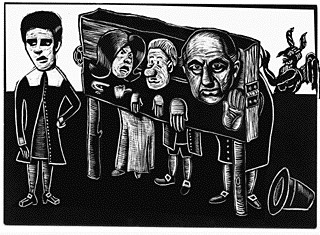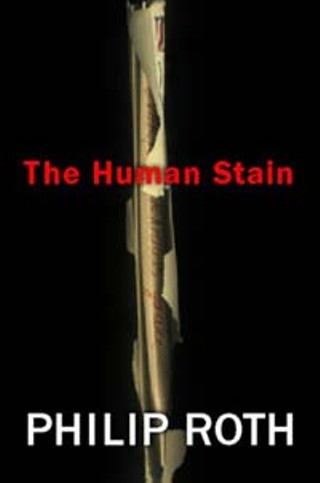America Gone Awry
Why Philip Roth Is at Home in His New Terrain
By Tom Grimes, Fri., June 23, 2000

The Human Stain
by Philip RothHoughton Mifflin, 352 pp., $26
Despite the good economy, people in America are terrified. Like a paranoiac's brain, which invents scenarios to torture itself, Americans -- and by this I mean Puritans, and this WASP streak runs deep in all of us, Anglo or not -- find things to be afraid of everywhere. Why else would so many of us be driving GMC Yukons and Ford Expeditions? Ostentation? Utility? No, protection. They're like tanks. They're assault vehicles. They keep the outside world at a great distance and the interior world snug as a family room in a gated community. We may live in McLuhan's virtual "global village," but corporeal community is the threat we most deeply fear.
A lot has been written about the American myth of "self creation," an Age of Enlightenment idea that was paid a good deal of lip service by our Constitutional Framers and America's first literary scribblers, the Transcendentalists. Class supposedly didn't matter. One could rise in America from the humblest of circumstances to become president. Take William Jefferson Clinton, the Elvis of American presidents. Just as Elvis made a success of himself by "passing" for Black -- in the music that he mimicked, the sexual moves he popularized for the white mainstream, the hedonist threat to straight society he temporarily represented -- Bill Clinton made a success of himself in politics by "passing" for Elvis.
Only, Col. Tom Parker came along in time to reinvent Elvis. With all those dumb counter-counterculture Elvis movies in the Sixties and, later, the Wayne Newtonish jumpsuits, Parker turned him into something desiccated and banal, something you might expect to come across in the Smithsonian, like Archie Bunker's armchair. If Elvis started out "passing" for Black, he went out whiter and plumper than an uncooked biscuit. Elvis came on the scene hip and went out square.

Bill Clinton needed a Col. Tom, and Hillary wasn't it. Neither was Vernon Jordan, and Jordan -- facilitator of the Lewinsky job hunt -- should have been the one to tell him. "Look, BC, alluding to having a Black sensibility is one thing. White kids do it all the time. What Col. Tom understood was that, take it too far, you gonna get their parents angry."
BC took it too far; he frightened us. Just when he should have been doing an Elvis-like whitewash, he did the reverse. You see, Americans will accept "self creation" to an extent. They forgave JFK being Catholic because he was also rich, handsome, and had a Boston accent. He was American aristocracy. If he wanted to fuck women in the White House, that was his prerogative. His privilege. BC had been allegedly enjoying roughly the same privilege all his life. But he wasn't an aristocrat; he was a homeboy. So, when we gave him the White House, we expected that it was time for him to stop. For the sake of balance. For the national good. This was the unwritten agreement, the secret deal. Because Americans don't like things pushed too far. Americans long for an aristocratic class, which is a wish we can't admit directly, but express as celebrity worship and the idolization of the famous. Aristocracy, as de Tocqueville wrote, made "a chain of all the members of the community, from peasant to king; democracy breaks that chain, and severs every link of it." This is why Americans are terrified. This is why in our history there are witches and Communists lurking everywhere. (Philip Roth's Nathan Zuckerman knows this. In his previous novel, NZ's idol Ira Ringold married one of the former and was accused of being one of the latter.) This is why William Jefferson Clinton was pilloried and censured on the televised floor of the nation's capitol. Because he didn't rise to the level of a moral aristocrat, which is what we elected him to become, and his betrayal of our longings ultimately brought him down.
In Roth's latest novel, The Human Stain, William Jefferson Clinton is often on narrator Zuckerman's mind. Coleman Silk, the novel's protagonist, has many American traits, "self creation" foremost among them, in common with Bill Clinton. Silk also "passes" for something he isn't and, later, with perfect dramatic irony, is brought down from his privileged position for a trivial remark. In a conversation Silk overhears near the campus he once lorded over and now is banned from, the reason for Clinton's downfall is obvious. Monica was someone "utterly corrupted by privilege," and Clinton was done in by his "niceness. ... Not his brutality but his niceness. Playing it not by his rules but by hers. ... What he didn't see was that he had to fuck her in the ass. ... Had he, I doubt she would have talked to Linda Tripp. Because she wouldn't have wanted to talk about that ... and the nation could have been spared this terrible trauma." For Roth, the creator of Portnoy, the pornographic always gets to the root of things.
The story line of The Human Stain is classically simple, much like the Greek tragedies Coleman Silk taught at Athena College. And, had Coleman Silk not casually uttered the word "spooks" in his college classroom, the estimable and aristocratic dean would have been spared his terrible personal tragedy. But, he did, so he wasn't. In a paranoid culture, which is the social spirit of a country founded by Puritans, only the non-paranoid is capable of committing a blunder capable of causing his or her downfall. Not being paranoid in America, particularly in politics or academia, the two microcosms where our dramas of social envy, spite, and hypocrisy are most starkly played out, amounts to possessing a fatal flaw. After 20 years of feeling entitled to everything, to "Morning in America," to being the world's only superpower, to 100% annual returns in the stock market, to SUVs, Americans are concerned about losing it all. We're afraid. For the sake of balance. Yes. For the national good. Democracy has severed all the links to a national community. And beneath this very real fact lies our fear that, without our money, we're nothing. So, we look for scapegoats to pillory and censor. We look for the privileged to stumble. Then, we pounce. It's a classic move, a basic human need, but amplified in a democracy where equality is the myth of "self creation" we preach, but entitlement and privilege and aristocracy is the state of being we crave.
Philip Roth's strength as a novelist is that he never writes as if he's finally reached a point of permanent self-definition. He's always searching for that definition, as a writer, as a Jew, and now, through the aging, reclusive Nathan Zuckerman, as an American. When Roth senses that he's entered new terrain, as he does in this final book of his "American trilogy," he writes as insightfully and vividly as any novelist in the world. Zuckerman is fully integrated here, yet he's no longer the subject of the narrative, and this makes all the difference. If Roth's writing had bogged down in the Seventies and Eighties, even the early Nineties, not consistently but often, it was because he was writing about NZ as protagonist. NZ as Nick Carroway, as observer and chronicler, is much more effective. The problem with Roth's weaker books was never that he wasn't up to his subject, it was that his subject wasn't up to his talents. In Patrimony, Sabbath's Theater, American Pastoral, and now The Human Stain, this is clearly not the case, and this may be the strongest of the books overall, the most unexpected, the most moving. Certainly, Faunia Farley, Silk's lover who "passes" as well as he does at being what she's not, is the most complex female figure Roth has drawn. And the closing section of the novel, with its calmly crazed portrait of Faunia's disturbed husband Les, paints a much more nuanced picture of an America gone awry than the overwrought image of Mickey Sabbath roaming the beach in New Jersey, draped in an American flag. Here, Roth is in full control of his material, and he doesn't overextend his reach into clumsy symbolism.
One of the Lewinsky pundits notes in the conversation Coleman Silk overhears before leaving behind the world of Athena College, "Still, you have to admit that this girl has revealed more about America since Dos Passos." Roth's new book does the same, and we don't come out looking pretty. We look paranoid, afraid. Afraid someone might take away something -- not our right to "self creation" or enlightenment, but to entitlement. Our material privilege. Our fear of actually having to live in a community, without having to resort to witch hunts and other enactments of our interior terrors. ![]()
Tom Grimes directs the MFA creative writing program at Southwest Texas State University.






